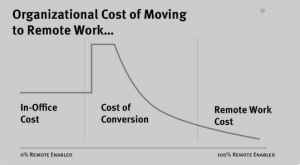Remote work has become a significant and lasting trend in the modern workforce, accelerated by advancements in technology and the global response to the COVID-19 pandemic. The purpose of this study is to demonstrate the shift towards remote work and its potential long-term implications for organizations:

Remote Work and its Potential Long-Term Implications for Organizations
-
Table of Contents
ToggleFlexible Work Arrangements:
- Remote work has proven that many jobs can be performed effectively outside traditional office settings. This realization may lead to increased acceptance of flexible work arrangements, such as hybrid models where employees split their time between remote and on-site work.
-
Access to a Global Talent Pool:
- Organizations can tap into a global talent pool without the constraints of geographical location. This allows companies to hire the best talent, regardless of their physical location, potentially fostering diversity and innovation within the workforce.
-
Technology and Infrastructure Investments:
- Organizations are likely to continue investing in technology and infrastructure to support remote work, ensuring that employees have the necessary tools, cybersecurity measures, and collaborative platforms to work seamlessly from different locations.
-
Employee Well-being and Work-Life Balance:
- Remote work can contribute to improved employee well-being by reducing commuting time and providing a better work-life balance. Organizations may focus more on initiatives that promote mental health, job satisfaction, and overall employee wellness.
-
Cost Savings:
- Companies can realize cost savings related to office space, utilities, and other overhead expenses by embracing remote work. This may lead to a reassessment of the traditional office structure, with some companies opting for smaller physical spaces or fully remote operations.
-
Adaptation of Leadership and Management Styles:
- Remote work requires a shift in leadership and management styles to accommodate the need for increased communication, trust-building, and performance evaluation in a virtual environment. Managers may need to develop new skills to lead distributed teams effectively.
-
Challenges in Collaboration and Communication:
- While technology facilitates remote collaboration, challenges in communication and collaboration can arise. Organizations may need to invest in training programs and tools to enhance virtual teamwork, creativity, and interpersonal connections.
-
Security and Compliance Considerations:
- Organizations need to prioritize cybersecurity measures and compliance standards to protect sensitive data when employees work remotely. This involves implementing secure remote access, data encryption, and ensuring employees follow security protocols.
-
Cultural Shifts:
- Remote work may lead to cultural shifts within organizations, fostering a more outcome-focused and results-driven culture. Performance metrics may evolve to emphasize productivity and efficiency rather than traditional measures based on time spent in the office.
-
Government and Legal Implications:
- The rise of remote work may lead to new regulations and legal considerations regarding remote employment, taxation, and labor laws. Organizations will need to stay informed and compliant with evolving legal frameworks related to remote work.
Overall, the long-term implications of remote work for organizations will depend on how well they adapt to this evolving landscape, leveraging the benefits while addressing the associated challenges. Successful integration of remote work into organizational culture requires thoughtful planning, continuous communication, and a proactive approach to technology and management practices.
